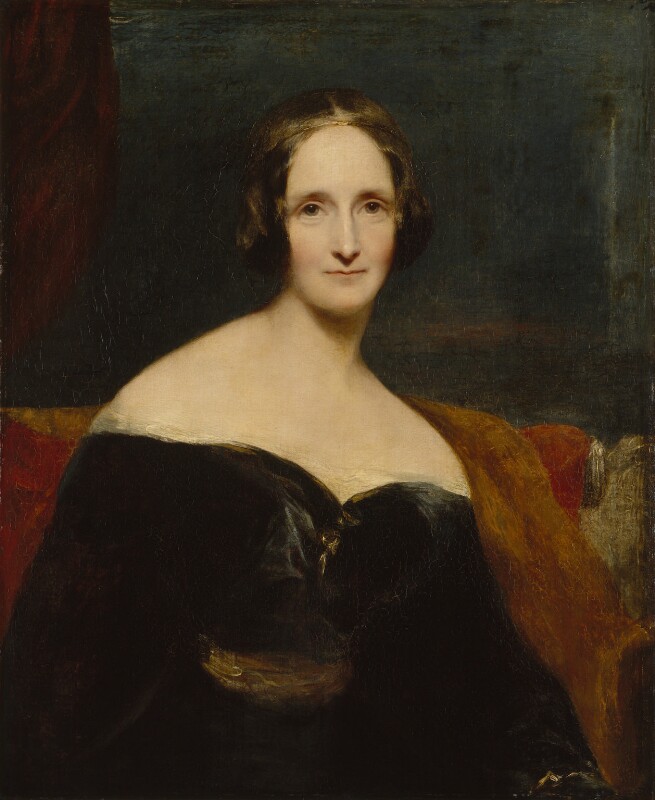Your cart is currently empty!
My imagination is dead, my genius lost, my energies sleep

© National Portrait Gallery, London
When Frankenstein author Mary Wollstonecraft Shelley returned to London in July of 1823, she was ravaged by grief following a string of tragedies. Since 1815, she had endured the deaths of three of the four children she shared with poet Percy Bysshe Shelley, and in 1822 also suffered a miscarriage; in 1816, her 22-year-old half-sister, Fanny Imlay, died by suicide; and in July of 1822, her husband perished in a sailing accident. Now, after five years in Italy and still in her mid-20s, Shelley was back in England with her son, and she was struggling to adapt to this new way of life.
The Diary Entry
Jan.18
I have now been nearly four months in England, and if I am to judge of the future by the past and the present, I have small delight in looking forward. I even regret those days and weeks of intense melancholy that composed my life at Genoa. Yes, solitary and unbeloved as I was there, I enjoyed a more pleasurable state of being than I do here. I was still in Italy, and my heart and imagination were both gratified by that circumstance. I awoke with the light and beheld the theatre of nature from my window; the trees spread their green beauty before me, the resplendent sky was above me, the mountains were invested with enchanting colours. I had even begun to contemplate painlessly the blue expanse of the tranquil sea, speckled by the snow-white sails, gazed upon by the unclouded stars. There was morning and its balmy air, noon and its exhilarating heat, evening and its wondrous sunset, night and its starry pageant. Then, my studies; my drawing, which soothed me; my Greek, which I studied with greater complacency as I stole every now and then a look on the scene near me; my metaphysics, that strengthened and elevated my mind. Then my solitary walks and my reveries; they were magnificent, deep, pathetic, wild, and exalted. I sounded the depths of my own nature; I appealed to the nature around me to corroborate the testimony that my own heart bore to its purity. I thought of him with hope; my grief was active, striving, expectant. I was worth something then in the catalogue of beings. I could have written something, been something. Now I am exiled from these beloved scenes; its language is becoming a stranger to mine ears; my child is forgetting it. I am imprisoned in a dreary town; I see neither fields, nor hills, nor trees, nor sky; the exhilaration of enwrapt contemplation is no more felt by me; aspirations agonising, yet grand, from which the soul reposed in peace, have ceased to ascend from the quenched altar of my mind. Writing has become a task; my studies irksome; my life dreary. In this prison it is only in human intercourse that I can pretend to find consolation; and woe, woe, and triple woe to whoever seeks pleasure in human intercourse when that pleasure is not founded on deep and intense affection; as for the rest—
“The bubble floats before,
The shadow stalks behind.”
…Oh, Shelley, dear, lamented, beloved! help me, raise me, support me; let me not feel ever thus fallen and degraded! my imagination is dead, my genius lost, my energies sleep. Why am I not beneath that weed-grown tower? Seeing Coleridge last night reminded me forcibly of past times; his beautiful descriptions reminded me of Shelley’s conversations. Such was the intercourse I once daily enjoyed, added to supreme and active goodness, sympathy, and affection, and a wild, picturesque mode of living that suited my active spirit and satisfied its craving for novelty of impression.
I will go into the country and philosophise; some gleams of past entrancement may visit me there.
Further Reading
Mary Shelley’s Journal, edited by Frederick L. Jones, was published in 1947, and it’s from that book that I’ve taken this entry. Now in the public domain, it can be read at the Internet Archive. However, for the completists with money to spend, a recommendation: in 1987 a definitive edition of Shelley’s journal was published by Oxford University Press, edited by Paula Feldman and Diana Scott-Kilvert. It comes in two volumes (1, 2). Annotations abound; nothing is left unexplained.
Make a Donation
If you’re able, please consider supporting Diaries of Note with a donation.
One response to “My imagination is dead, my genius lost, my energies sleep”
-
“Woe, woe, and triple woe” is my new mantra for winter. Beautiful entry, thank you

Leave a Reply